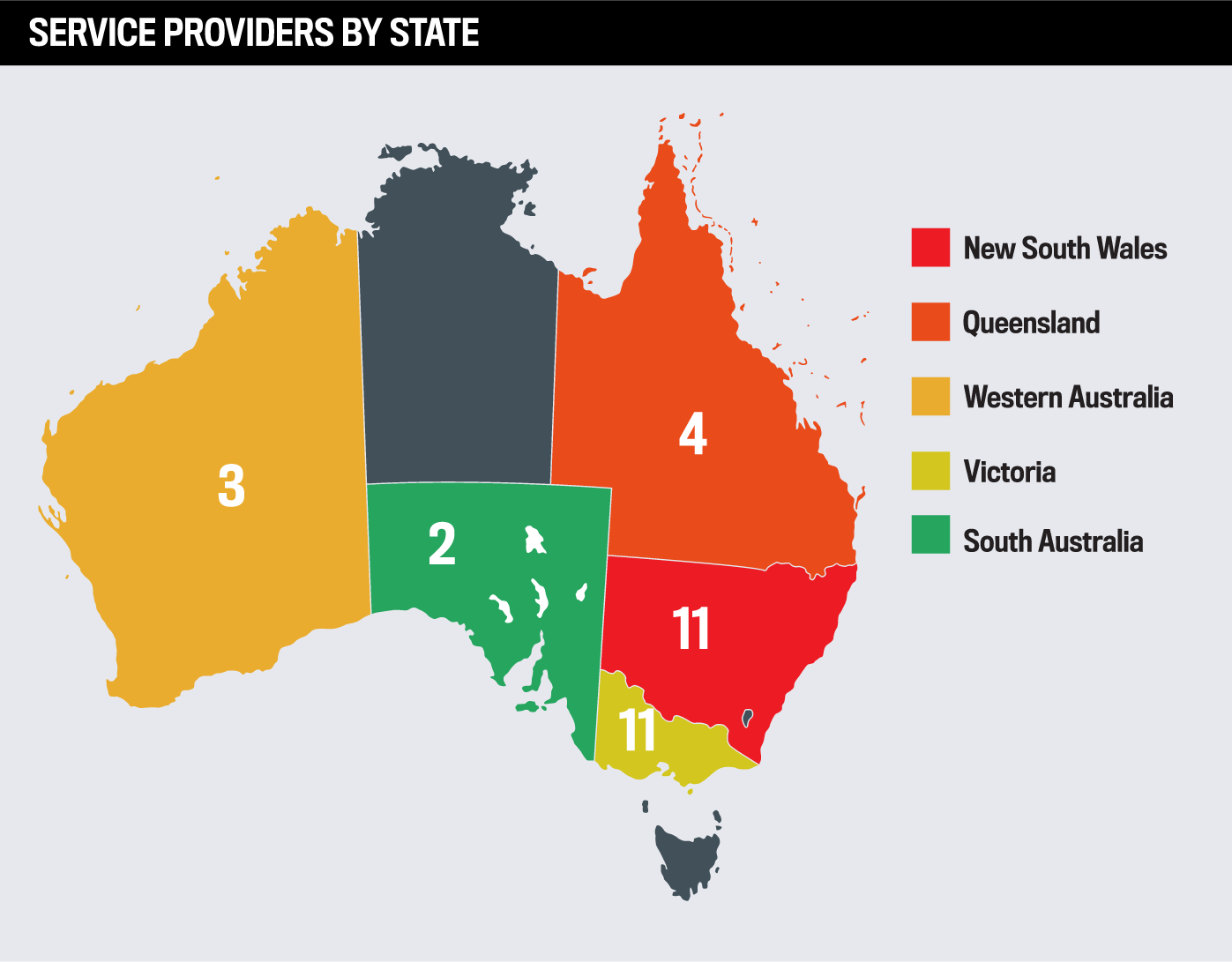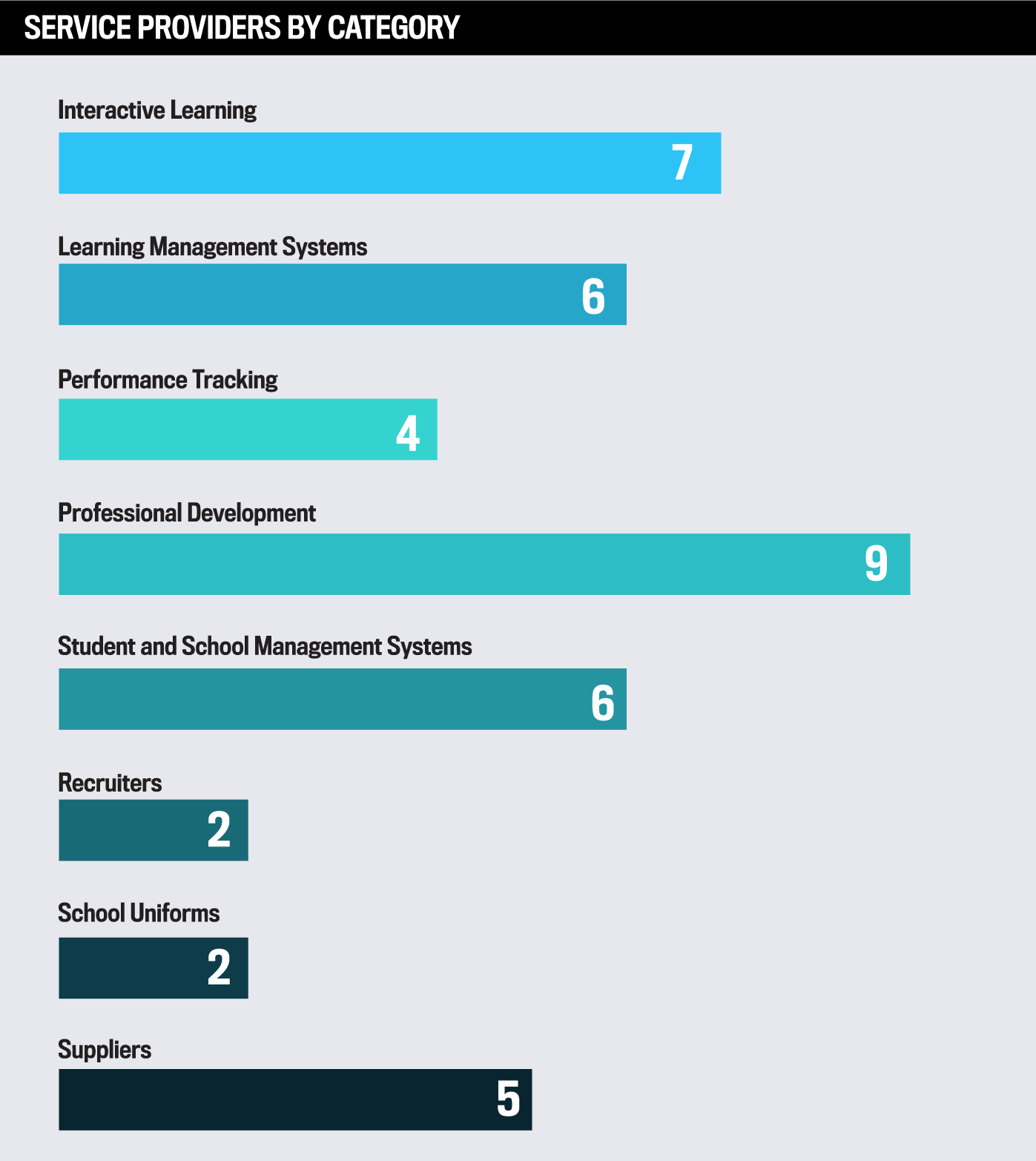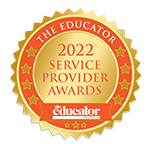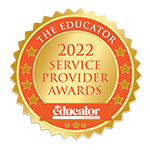- K/12
- Higher Education
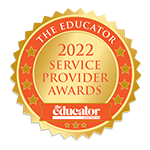
Service Provider Awards 2022
Jump to winners | Jump to methodology
Turbocharging innovation in education
Despite the massive disruptions caused by the Covid-19 pandemic in the education sector, demand for edtech solutions in Australian schools has been on an upward trajectory. When the pandemic led to school lockdowns in 2020, demand for edtech tools soared by a staggering 300% in March of that year alone, according to research from Compass. Since then – and even after students and staff returned for face-to-face learning – schools have been turning to a range of different service providers.
That all underlines just how vital The Educator’s Service Provider Awards are to the industry. They lead the way in a competitive environment, with only the best being able to shine.
One winner, Lumination, which aims to “change the landscape of learning” via immersive technology, illustrates the standards that have been set. The company’s latest results show a 94% customer rating, and communications and public relations manager Alicia Baertsoen says, “Our customers regularly comment on our strengths being curriculum integration, great resources and technical knowledge.” That’s coupled with the firm’s fast turnaround times. “We respond to all queries from schools within a 48-hour window,” she adds.
“Through the use of immersive technology, students learn faster, retain more and build confidence for future careers. At the same time, we equip facilitators and teachers with the end-to-end support, resources and software they need to succeed”
Rebecca Bendikov, Lumination
Another winner is LiteracyPlanet, an engaging online resource that provides literacy skills improvement to students worldwide, regardless of their location and aptitude. Their attitude showcases the commitment needed to make a mark in the industry. “LiteracyPlanet is more than just a teaching and learning resource. It’s also a team of like-minded individuals who care deeply about making a positive and lasting difference to every child around the world,” explains marketing and communications executive Angela Smith.
The demand for service providers is most apparent in digital and blended learning, with remote learning accelerating the need for technologies that enable personalised learning outside the classroom. EduGrowth estimates that there are approximately 600 edtech organisations founded in Australia or by Australians servicing the domestic and export markets around the world – a number that is growing in tandem with demand for digitally enabled education.
Innovative solutions to complex problems
Looking back on the last two years, one could argue the pandemic has been the most consequential trial-and-error process for education in living memory.
For schools whose IT resources, distance education contingencies and staff were ill-equipped for the shift to remote learning, the 2020–2021 period was a painful experience. For others, the lockdowns were a chance to put years of careful planning into practice.
This real-time experiment has led to multiple studies to examine what works and what doesn’t when it comes to the remote learning programs initiated during the pandemic, and while it is likely to take some time before the big answers are finally known, one thing is for certain – more and more schools are turning to edtech solutions for help.
One resource is the Lumination Learning Lab, a 10-step implementation plan. “From a pedagogical perspective, we understand the inclusion of this technology in a teacher’s toolbox requires an element of change management, and our education team supports teachers through this journey through professional development training and upskilling,” says Baertsoen.
“The 10-step plan includes items such as initial onboarding, curriculum planning support, student incursions delivered by our team and a series of professional learning and development programs for teachers who are building up the courage and confidence to run a Lab session on their own. Aligning with the curriculum and student outcomes is a key feature in our approach.”
The company doesn’t then step back totally. It continues to provide support through lesson plans, webinars, pedagogical guides, quick start technology guides and customer service calls.
Looking at today’s education landscape, there is perhaps no better time for schools to be exploring innovative solutions to the many complex problems they’re facing. Ongoing teacher shortages, a widening digital divide, and the worsening youth mental health crisis are taking a toll on schools’ ability to focus on their most important job – preparing young people for the future.
Service Provider Atomi helps schools boost student engagement and retention by using the latest research in pedagogy and neuroscience.
Co-founder Tom O’Donahoo says one of the important features is personalised revision recommendations, which uses artificial intelligence to understand a student’s individual strengths and weaknesses and predict how they’ll retain content over time. “This enables students to focus on revising what’s most important to them, drastically reducing the work required to retain content in their long-term memory.”
“Compared to unguided revision, where students decide what they think they should revise, we’ve seen personalised revision recommendations increase revision efficiency by up to 35%. This means students are spending almost one-third less time to generate the equivalent outcome.”
O’Donahoo says Atomi generates such gains because students often wait too long before revising content or they spend excessive time revising content they’ve already retained.
“Knowing the impact or efficacy of any learning solution differentiates the best education technologies. Showing impact in real time by bookending learning with diagnostics is the most dynamic and reliable way to assess efficacy and learning outcomes”
Tom Richardson, LiteracyPlanet
Data-driven insights changing the game
Schoolbox general manager, Grant van der Kruk, says many schools today are faced with the challenge of “disparate edtech tools that are misaligned with their strategic direction. This often leads to inefficiencies, staff frustration and unnecessary administrative burden”.
He says his company addresses this challenge by working with schools and integration partners to strategically align technology use with the school’s needs and goals.
Van der Kruk notes the importance of edtech firms designing their products in partnership with schools so they can incorporate customer feedback into product design and address key school objectives based on their current challenges.
“Key focus areas include curriculum mapping, student insights, dashboards and notifications, making it easier for teachers by surfacing student academic performance and wellbeing – all within Schoolbox. The Schoolbox platform brings disparate systems together through a single entry point. And, with our integration partners, we offer further support to schools by simplifying processes, creating efficiencies, and enhancing user engagement.”
For LiteracyPlanet, content is connecting, as it has been aligned to 76 curriculum standards around the world, such as those in Australia, Brazil, Canada, India, New Zealand, Saudi Arabia, United Kingdom, and the US. The bedrock of this success is based on time-tested literacy outcomes.
“This includes providing quality content that enables a consistent and logical progression of skill acquisition in each strand of literacy. This is why we go the extra mile to align to a number of curriculums,” says Smith. “Firstly, to make sure the automated delivery of activities follows a recognised continuum of learning, and secondly, to equip educators with the means to easily identify content-to-curriculum linkages so they can create and assign activities that consolidate their work in the classroom.”
“Compared to unguided revision, where students decide what they think they should revise, we’ve seen personalised revision recommendations increase revision efficiency by up to 35%”
Tom O’Donahoo, Atomi
Interactive learning breaking down barriers
Studies have shown that VR and AR technologies can be used to improve the design of learning spaces, allowing students to learn without distraction, as well as simulate the classroom experience for pre-service teachers who can test out their teaching skills to support learning, engaging their learners, and managing behaviours.
And these innovations aren’t going away anytime soon. The Educause Horizon Report, which profiles key trends and emerging technologies and practices shaping the future of teaching and learning, forecasts that VR, AR and mixed technologies will become increasingly prominent in schools for at least a decade.
Lumination uses a design thinking framework alongside AI, VR and AR to help students develop and harness the essential skills they need to thrive in the future workforce.
“Through the use of immersive technology, students learn faster, retain more and build confidence for future careers,” Rebecca Bendikov, Lumination’s head of education programs, tells The Educator.
“At the same time, we equip facilitators and teachers with the end-to-end support, resources and software they need to succeed.”
LiteracyPlanet’s CEO Tom Richardson says that while there’s a great deal of choice available for educators in the interactive learning space, this creates a challenge both for them and service providers in that it’s difficult for them to know, on face value, how beneficial resources will be for teachers and students.
“Knowing the impact or efficacy of any learning solution differentiates the best education technologies,” Richardson says.
“Showing impact in real time by bookending learning with diagnostics is the most dynamic and reliable way to assess efficacy and learning outcomes. And that’s where our focus lies at LiteracyPlanet.”
Service Provider Awards 2022
Interactive Learning
- Accelium and Mind Lab Australia
- Sammat Education
- STEM Punks
- Toolbox Education
Learning Management Systems
- Classe365
- ClearTrack
- Instructure
- Moodle
- Open LMS
Performance Tracking
- Classe365
- ClearTrack
- Instructure
Professional Development
- Australian Council for Educational Leaders
- Australian Teacher Aide
- Corwin Australia
- Critical Agendas
- EduInfluencers
- Hutton Consulting Australia
- Sammat Education
- STEM Punks
Student and School Management Systems
- Classe365
- ClassCover
- Compass Education
- PeopleBench
- Udio Systems
Recruiters
- Frontline Education
- Hutton Consulting Australia
School Uniforms
- LW Reid
- Williamson International/The Uniform Company
Suppliers
- DMC Group
- FUJIFILM Business Innovation Australia
- imageseven
- Matilda Education Australia
- Sammat Education
Methodology
Between June and July 2022, The Educator called on education service providers catering to schools across Australia to participate in the annual Service Provider awards. Entries were invited across eight categories: learning management systems, recruiters, student and school management systems, school uniforms, interactive learning, performance tracking, suppliers, and professional development.
The Educator team objectively assessed each entry for true innovation and proven success, and benchmarked each nominee against the others. By the end of the judging process, the team narrowed the entries down to 31 of the sector’s most outstanding service providers, producing the highly anticipated Service Provider Awards 2022 list.



